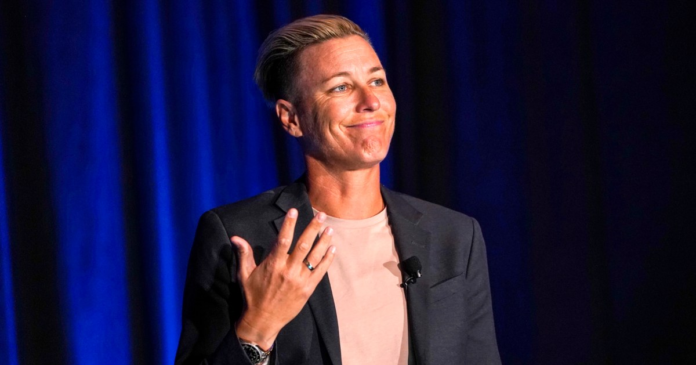Retired U.S. women’s soccer star Abby Wambach began cutting ties on Thursday with a joint venture linked to NFL Hall of Famer Brett Favre that received millions of dollars in Mississippi welfare funds, hours after NBC News contacted her about the matter.
Wambach told NBC News in a statement she has “initiated the process to immediately and fully divest myself from any involvement — financial and otherwise” with Odyssey Health Inc. and Prevacus, two firms jointly touting a nasal spray designed to treat concussions. Her statement came hours after NBC News called her to ask about her involvement in the controversial venture.
Odyssey Health Inc. did not respond to multiple requests for comment.
Wambach told NBC News via text, “This morning, I was dismayed to learn disturbing information about a company I had backed as part of my deeply personal effort to lessen the impact of concussion-related injuries.”
Wambach wrote that she insisted the divestment “be complete by end of day today.”
Wambach did not elaborate on what new information she learned.
The drug, known as PRV-002, was developed by a company called Prevacus, run by CEO Jake VanLandingham. Prevacus sold the drug to Odyssey Health in 2021 and VanLandingham became the head of drug development of Odyssey Health. In a Securities and Exchange Commission filing from 2021, Prevacus and Odyssey signed an agreement for a joint venture to develop the drug.
Prevacus and VanLandingham were sued by the state of Mississippi in May 2022 in an effort to recoup $2.1 million in federal welfare funds the company received — money that was supposed to be used to help low-income children and families in the nation’s poorest state.
Text messages filed in court and first reported by Mississippi Today show the money went to the company after Favre solicited help from then-Gov. Phil Bryant, including an offer to Bryant of stock in the company.
“Don’t know if legal or not but we need cut him in,” Favre texted a company official, referring to Bryant, adding three days later: “Also if legal I’ll give some of my shares to the Governor.”
In an interview with Mississippi Today in April, Bryant said he didn’t accept the offer because it would not have been appropriate. But he acknowledged that after he left office, he agreed by text to accept stock in the company. Bryant instead cut ties with the firm after the state auditor issued a report that exposed the improper welfare spending.
Wambach was among several former athletes who joined Favre in trying to help the venture market its drug, which has not completed the FDA approval process.
“Since I genuinely believed this company was being transparent about a product that could spare the next generation of athletes from the severe impact of concussion injuries that I endured as a professional athlete, I am profoundly angry, disappointed, and saddened by what I learned today,” Wambach said in her statement on Thursday. “Notwithstanding these jarring developments, I will stay true to my mission of securing better, more equitable treatment of our athletes in every area of sport.”
Wambach publicly aligned herself with Prevacus in 2018, becoming an investor and began serving on the company’s Sports Advisory Board.
Her biography was removed from the Odyssey website Thursday afternoon.
When Wambach signed on, Favre was the largest individual outside investor, with $250,000 committed, according to a lawsuit filed by the Mississippi State Department of Human Services.
Favre hosted a meeting at his home in January 2019 with the company’s CEO, VanLandingham, and the then-head of the state’s welfare agency, John Davis, the government alleges in court documents. Davis has since pleaded guilty to federal fraud charges.
Following this meeting, the state welfare agency gave a total of $2.1 million in federal welfare funds to Prevacus and its corporate affiliate Prevasol MD through a grant recipient, according to the welfare agency lawsuit that names Prevacus, Prevasol MD and VanLandingham as defendants.
In a text message to NBC News, VanLandingham said the $2.1 million “was used to develop our drug for human trials to treat concussion.”
Favre has maintained that he did not know the funds that were being distributed to the pharmaceutical company or to a separate project to build a volleyball facility at the University of Southern Mississippi were welfare funds. Favre personally received $1.1 million in welfare funds, a sum he repaid. The state auditor says he still owes $228,000 in interest. Favre has not been charged with any crime.
The federal welfare money that was paid to Prevacus has not been repaid, according to the Mississippi state auditor’s office.
VanLandingham declined to comment as to whether Odyssey/Prevacus would return the funds.


